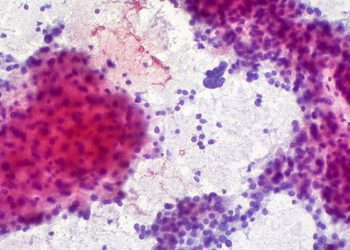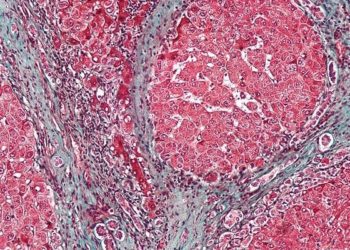Hep B reactivation common after liver resection for HBV-related hepatocellular carcinoma
[tabs tab1=”2MM Rundown” tab2= “2MM Full Report”]
[tab]
Image: PD
1. Liver failure was more frequent in post-hepatectomy patients with HBV reactivation, resulting in shorter 3-year disease-free survival and overall survival.
2. Prophylactic antiviral treatment is protective against HBV reactivation.
Routine prophylactic antiviral treatment should be used for patients with hepatocellular carcinoma associated with Hepatitis B. If administered prior to partial liver resection, this prophylaxis lowers the risk of HBV reactivation, which is associated with shorter intermediate disease-free and overall survival. This study is limited by its retrospective nature and lack of randomization. The true effectiveness of HBV prophylaxis for prolonging post-hepatectomy survival should be evaluated by a randomized, controlled, multi-center trial. The authors identified multiple risk factors for HBV reactivation, disease-free survival, and overall survival that can be further studied prospectively. Finally, preoperative prophylaxis is a relatively low-risk intervention that can be immediately used in this patient population resulting in a potential 20-month increase in overall median survival.
Click to read the study in Annals of Surgery
[/tab]
[tab]
Image: PD
1. Liver failure was more frequent in posthepatectomy patients with HBV reactivation, resulting in shorter 3-year disease-free survival and overall survival.
2. Prophylactic antiviral treatment is protective against HBV reactivation.
This [retrospective] study examined over two and a half thousand patients with hepatocellular carcinoma and a positive Hepatitis B surface antigen who underwent a liver resection. This study assessed the rate of HBV reactivation post-operatively, demonstrating that it was high even for patients with a low preoperative HBV DNA level. The risk factors that independently influenced HBV reactivation were viral markers such as positive Hepatitis B E Antigen (a sign of high viral replication), preoperative HBV-DNA levels over 200 and high inflammation as well as characteristics of the surgery such as preoperative transarterial chemoemboliztion, long operation time, and blood transfusion. Prophylactic therapy with antivirals such as lamivudine was found to be protective against HBV reactivation. Hepatitis B reactivation was found to be a significant independent risk factor for lower disease-free survival rate at three years and overall survival.
In sum: Routine prophylactic antiviral treatment should be used for patients with hepatocellular carcinoma associated with Hepatitis B. If administered prior to partial liver resection, this prophylaxis lowers the risk of HBV reactivation, which is associated with shorter intermediate disease-free and overall survival. This study is limited by its retrospective nature and lack of randomization. The true effectiveness of HBV prophylaxis for prolonging post-hepatectomy survival should be evaluated by a randomized, controlled, multi-center trial. The authors identified multiple risk factors for HBV reactivation, disease-free survival, and overall survival that can be further studied prospectively. Finally, preoperative prophylaxis is a relatively low-risk intervention that can be immediately used in this patient population resulting in a potential 20-month increase in overall median survival.
Click to read the study in Annals of Surgery
By Asya Ofshteyn and Allen Ho
More from this author: Post-operative PTSD intervention improves physical outcomes in trauma patients, Survival improved with lower transfusion threshold in acute upper intestinal bleeds, Single-port appendectomy shows similar outcomes to conventional laparoscopy
© 2013 2minutemedicine.com. All rights reserved. No works may be reproduced without written consent from 2minutemedicine.com. Disclaimer: We present factual information directly from peer reviewed medical journals. No post should be construed as medical advice and is not intended as such by the authors or by 2minutemedicine.com. PLEASE SEE A HEALTHCARE PROVIDER IN YOUR AREA IF YOU SEEK MEDICAL ADVICE OF ANY SORT. Content is produced in accordance with fair use copyrights solely and strictly for the purpose of teaching, news and criticism. No benefit, monetary or otherwise, is realized by any participants or the owner of this domain.
[/tab]
[/tabs]




![[Policy Statement] New guidelines for pediatric acute otitis media released](https://www.2minutemedicine.com/wp-content/uploads/2013/03/12449_lores1-75x75.jpg)